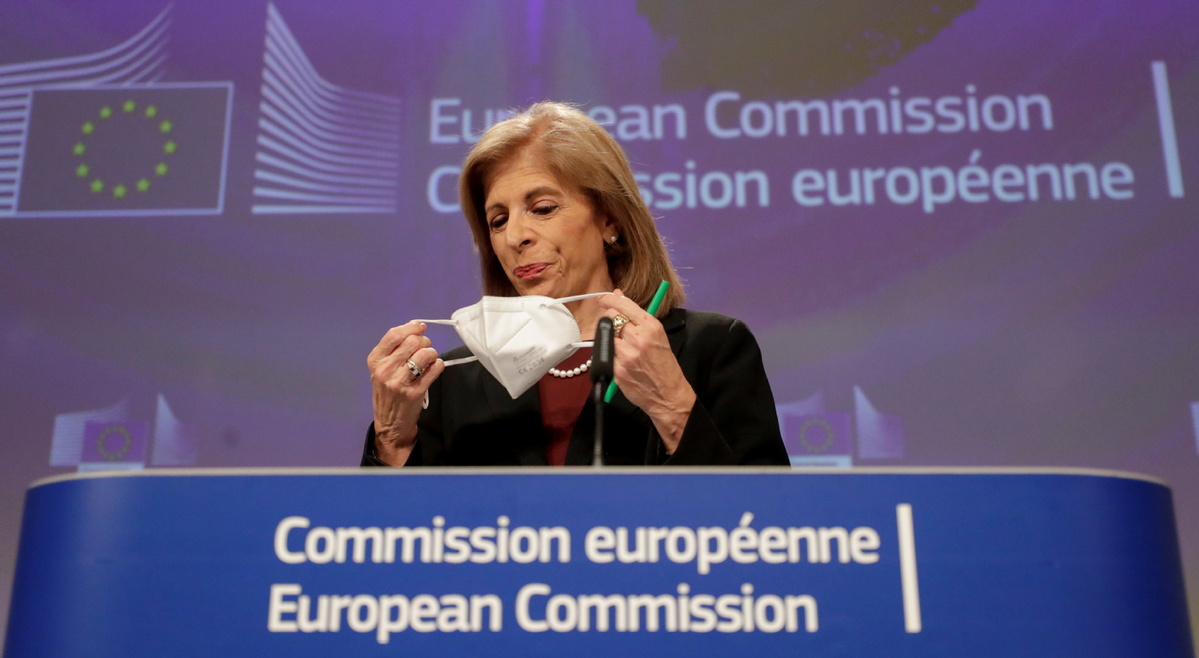Europe backs down over vaccine supply row
By Julian Shea in London | China Daily Global | Updated: 2021-02-01 09:32

Export restrictions draw widespread condemnation from UK politicians
European Commission President Ursula von der Leyen has assured United Kingdom Prime Minister Boris Johnson "there will be no disruption of contracts that we have with any (novel coronavirus vaccine) producer in the European Union" after a high-profile supply dispute.
A political storm blew up when vaccine manufacturer AstraZeneca said it could not meet its contractual obligation to the 27-member EU, and the commission responded by demanding that company divert supplies put aside for the United Kingdom, whose own contract was agreed earlier, and whose supply and use had already begun.
Tensions rose when, less than a month after the Brexit process was completed, the Commission announced plans to introduce checks at the border between EU member state the Republic of Ireland and Northern Ireland, part of the UK, the avoidance of which was a key element of the Brexit agreement. This drew international criticism and was subsequently withdrawn.
Speaking on the BBC's The Andrew Marr Show, Britain's international trade secretary, Liz Truss, said she was "very pleased" the EU had taken a step back and that Johnson had been told such behavior would not be repeated.
"What I want to do now is work with fellow trade ministers to keep these supplies open and to move away from the idea of vaccine nationalism and protectionism, which we know simply harms our global health efforts and harms our global economy," she said.
Senior ministers have underlined the message of wanting to move on. Cabinet Office minister Michael Gove said that the EU accepted it had "made a mistake", and following talks with commission executive vice-president Valdis Dombrovskis, Foreign Minister Dominic Raab said he was "reassured the EU has no desire to block suppliers fulfilling contracts for vaccine distribution to the UK".
Ireland's prime minister, Micheal Martin, said the first he knew about the row was when the commission's border checks threat was made public, and that "there are a lot of lessons to be learnt" over the incident.
As soon as he heard, he contacted von der Leyen, saying he should have been informed first, and making it clear to her the "very serious implications the move would have", information she had considered before announcing the change of heart.
Tony Blair, a former UK prime minister, who opposed Brexit and was closely involved in the Northern Ireland peace process, told Sky News that the commission's behavior had been "very foolish".
"I was somebody who negotiated the Good Friday Agreement; it's brought peace to the island of Ireland and it is absolutely vital that we protect it and that's why what the European Commission did was unacceptable but … fortunately they withdrew it very quickly," he added.
Scientists joined politicians in their condemnation of the message of vaccine nationalism that had been sent out by the commission's threat.
"Companies are working as fast as they can to protect everyone. Export restrictions do no one any good and we urge governments to avoid them," wrote Richard Torbett, head of the UK's Association of the British Pharmaceutical Industry, and Nathalie Moll, head of the European Federation of Pharmaceutical Industries and Associations, in the Observer newspaper.
Britain's vaccination program is ahead of that of the EU, which only signed contracts months later.
Writing in the Sunday Telegraph, vaccines minister Nadhim Zahawi said Britain had gone "out of our way" to help the bloc with supplies and "will continue to do so", but speaking on Sky News, Truss was slightly more cautious in her language.
"Of course, we first need to make sure that our population is vaccinated," she said. "We have a target to get the most vulnerable vaccinated by late February. It's a bit too early to say how we would deploy vaccines, but we certainly want to work with friends and neighbors, we want to work with developing countries."
























